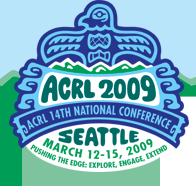Jennifer Wertkin, MLIS, JD: An Interview with a Law LibrarianWho travels in packs, wears black, and can sue you for slander? The students in the Law MLIS Program – that’s who.
Designed to prepare lawyers to serve as law librarians in courts, federal and state units of government, law schools, corporations and firms, the program admits, on average, ten students per year. Working on my last quarter at the Information School, I have seen two cohorts trudge through this accelerated, four-quarter program. Having taken the legal research courses open to regular MLIS students, I have spent a lot more time with this year’s class and have become increasingly curious about them, wondering how they chose law librarianship and the University of Washington, what their coursework entails and how it differs from mine, and where they would like their degree to take them. To get an idea, I asked Jennifer Wertkin, an astute and compassionate individual who also knows how to rock black, patent leather clogs. Originally from New York, Jennifer was educated at Bates College, in Lewiston, Maine, where she earned majors in anthropology and religion before moving to the University of Wisconsin, where she obtained her J.D. in 1997. Focusing primarily on Indian Law, Jennifer had practiced in Wisconsin, Arizona, and New York and had gained over ten years of experience before deciding to become a law librarian. Meagan Lacy: Why did you decide to stop practicing law? Jennifer Wertkin: I was an unhappy lawyer. One feels so much pressure – or at least one ought to since, as a lawyer, you are ultimately responsible and accountable for what happens to your clients. I thought that by becoming a librarian, I could continue to make a contribution but at the same time leave the stress behind. ML: Why law librarianship? JW:After expressing my discontent to a librarian friend who works at Brooklyn Public, she casually suggested the idea. That same day, I received my alumni catalog, which featured an article about law librarianship. A light bulb went off. So, I started talking to several academic law librarians, and observed that they were a happy, smart bunch, satisfied with their jobs. I admired their quality of life – how they were making a contribution but were also able to leave their work at the end of the workday. This was in August 2007, and I decided I would apply for the 2008-2009 school year. Meanwhile, I interned at the NYU Law Library, where I assisted in faculty research, and the Brooklyn Law Library, where I gained experience in technical services and cataloging. These internships were really helpful and solidified my decision.
ML: Why Seattle? Why the Information School? JW:I wanted to be an academic law librarian, and I found that the structure of the program was well suited to that.
ML: What are your program requirements? JW:We take most of the same classes as you, except for LIS 560, 570, and 580. In addition, we take the law librarianship courses. [They are: Washington State Legal Research, Federal Legal Research, Selection and Processing of Law Library Materials, Library Administration, and Current Issues in Law Librarianship.] We also have to complete a 20-30 paged thesis, which is due at the end of April(!), choose and participate in a three-and-a-half week summer internship (I’ll be doing mine with the NAACP Legal Defense and Educational Fund), contribute to the Gallagher blogs, and create or revise an existing online legal research guide (I’m making one on Canadian Legal Research).
ML: A thesis? What is your thesis on? JW:Legal research instruction. I want to know what research skills practicing attorneys lack so that, as an academic law librarian, I can better inform my instruction. Other students might do statistical analysis (e.g. How are sources cited in law reviews?), trends in collections (especially with regard to interdisciplinary studies – like psychology and law), or biographies of famous law librarians.
ML: Wow. Sounds like a lot of work. What is typical day for you like? JW:A typical day starts around 9:00 in the morning. We have class and then go to our internships. Our internships are built right into the program. We work for 10-15 hours per week, some evening and weekends, at either the UW Gallagher Law Library or the King County Library. I work at Gallagher. The rest of the students and I rotate among three departments: Reference Services, Access Services, and Technical Services. That way, we get experience in each.
ML: What kinds of questions do you get at the reference desk? JW:Students doing research for law review articles, faculty requests for scholarship that they are writing, state survey questions from students and professors (both from the UW and other campuses) and sometimes from the public...
ML: What the bleep is a state survey? JW:A state survey is usually a question about which states have or do not have a certain law. [For instance, which states ban smoking in eating establishments?]
ML: Do you feel like you’re missing anything? JW:I do wish that I were able to take more electives – I was able to take Government Publications last quarter – and get more involved in the ischool culture.
ML: Any advice for those thinking about becoming a law librarian? JW:Take advantage of the internships! And, if you are interested in academic law librarianship, I think that the program at the University of Washington is even more complimentary than others. Just know that the pace is fast and rigorous!
For more information about the Law MLIS Program, see the program requirements page on the Information School website. Also, if you are a regular MLIS student, but are still interested in law librarianship, see Law Librarianship: It doesn't require a JD!!, an article appearing in a 2005 issue of The Silverfish, written by former MLIS student and current Perkins Coie librarian Robyn Hagle.
|
April 15,
2009
|






